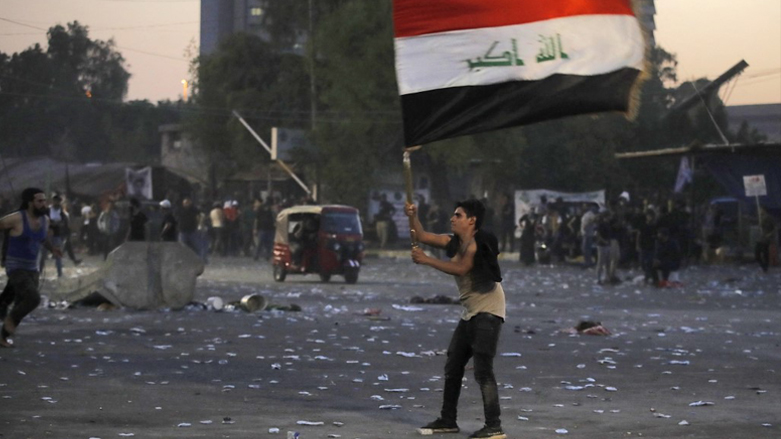US welcomes call on Iraqi protestors to withdraw—but does not mention Sadr’s name!
The Coordination Framework lost the 2021 elections.

WASHINGTON DC, United States (Kurdistan 24) – Late on Monday, the US ambassador to Iraq, Alina L. Romanowski, tweeted America’s welcome of the call made by Muqtada al-Sadr to his followers to cease their protest in Baghdad’s “Green Zone” and return home.
— Ambassador Alina L. Romanowski (@USAmbIraq) August 30, 2022
Romanowski’s tweet came as Iraq’s caretaker Prime Minister Mustafa al-Kadhimi threatened to resign, if Iraq’s political chaos continued, while Iraqi President, Barham Salih called for holding early elections (as Sadr now demands) as a way out of the current crisis.
Romanowski’s tweet was the first indication that the Biden administration might be modifying its studied neutrality toward Iraq’s political struggles, ongoing since elections last October.
Yet her tweet did not mention Sadr by name. Whether that is significant or not, remains to be seen. But it may be noteworthy, as the Biden administration has long taken a neutral position in Iraq’s political struggles, drawing criticism from Congress, as well as analysts, that its studied neutrality facilitates Iranian efforts to boost its influence in Iraq.
Iran’s Judicial Coup
Sadr was the biggest vote-getter in the 2021 elections. With the Kurdistan Democratic Party (KDP), the largest Kurdish party, and the Sunni Arab Taqaddum (Progress) Party, led by the Speaker of Parliament, Mohammed al-Halbousi, Sadr had a majority. That was enough to form a new government.
But as Michael Knights, a scholar at The Washington Institute for Near East Policy, explained, the pro-Iranian parties in Iraq, the “Coordination Framework,” as they call themselves, “undertook a judicial coup in early 2022, in partnership with the Iranian Islamic Revolutionary Guard Corps (IRGC) Force general Esmail Qaani and the head of [Iraq’s] Supreme Judicial Council Judge Faiq Zaydan.”
Those parties conceived and executed a plan, in coordination with Nuri al-Maliki, Iraqi Prime Minister from 2006 to 2014, when he was forced to resign, as a condition for US support to Iraq to fight ISIS, which Maliki was judged to have helped to create, because of his extreme Shi’ite sectarianism.
The Coordination Framework lost the 2021 elections. They then tried various ways to change the outcome. However, that effort failed, so they turned to suborn Iraq’s Supreme Federal Court (SFC), through Maliki, “who had cultivated key members of the judiciary, since he groomed and elevated them through the ranks during his long tenure as prime minister,” as Knights explained.
The SFC then—in early 2022—changed the rules for forming a government. The required threshold was raised from a simple majority of the seats in parliament to a two-thirds majority!
Moreover, as Knights noted, the US knows about this maneuver—which he described as “a foreign-backed judicial coup.” But it says nothing.
Critics: US Needs to Do More to Support its Friends in Iraq
Critics, including US Congressmen, both Democrat and Republican, as well as analysts, have complained that the administration’s neutrality has left Iraq particularly vulnerable to Iranian manipulation—and the story above, as told by Knights, is a prime example.
Those critics have argued that the State Department needs to be significantly more active in supporting America’s friends in Iraq in order to counter Tehran’s efforts to expand its influence in Iraq.
Yet such criticism did not seem too much influence US policy—until, perhaps, now. The dominant interest in that part of the world of the Biden administration, along with its European Union (EU) partners, has been restoring the 2015 Iranian nuclear accord, formally known as the Joint Comprehensive Plan of Action (JCPOA), which Donald Trump left in 2018.
Attributing such a high priority to reviving the JCPOA has been a significant factor in the Biden administration’s tendency to overlook, and fail to counter, Iranian activities in Iraq. But, perhaps, that is beginning to change.
Embassy Statement Modifying Studied US Neutrality?
“The United States welcomes recent calls for protestors to immediately cease conflict and withdraw from government institutions,” the tweet from Romanowski began.
“We are encouraged by reports that participants have begun to disperse,” and “we urge all citizens to allow their government institutions to continue to function in support of Iraq’s security, stability, and sovereignty,” Romanowski continued, even as she did not mention Sadr, as the individual who was responsible for the very actions she praised!
“The urgent challenges facing Iraq can only be resolved through serious dialogue,” Romanowski’s tweet concluded. “Now is the time.”
Romanowski’s statement differs in one slight—but significant—respect from that of the State Department’s Deputy Spokesperson Vedant Patel, who was briefing reporters at roughly the same time.
This reporter did not know then of the ambassador’s tweet, but in the hope of drawing out a positive statement, asked him, “Muqtada al-Sadr has called on his supporters to end their protests. Do you have a response to that?”
Patel merely repeated language he had used earlier: “As we’ve said previously, now is the time for all parties to resolve the current impasse.”
Patel did not note that Sadr, named or not named, had taken a positive step.
Still no Communications between Senior US, Iraqi Leaders
On Monday, Patel was asked, if there had been any communications between the senior US and Iraqi officials concerning the political crisis. His answer was no.
On Tuesday, the second day of the violent clashes, which had left some 30 people dead, Patel was asked much the same question, including, “Does Secretary Blinken plan to call the [Iraqi] prime minister?”
Again, the answer was no.